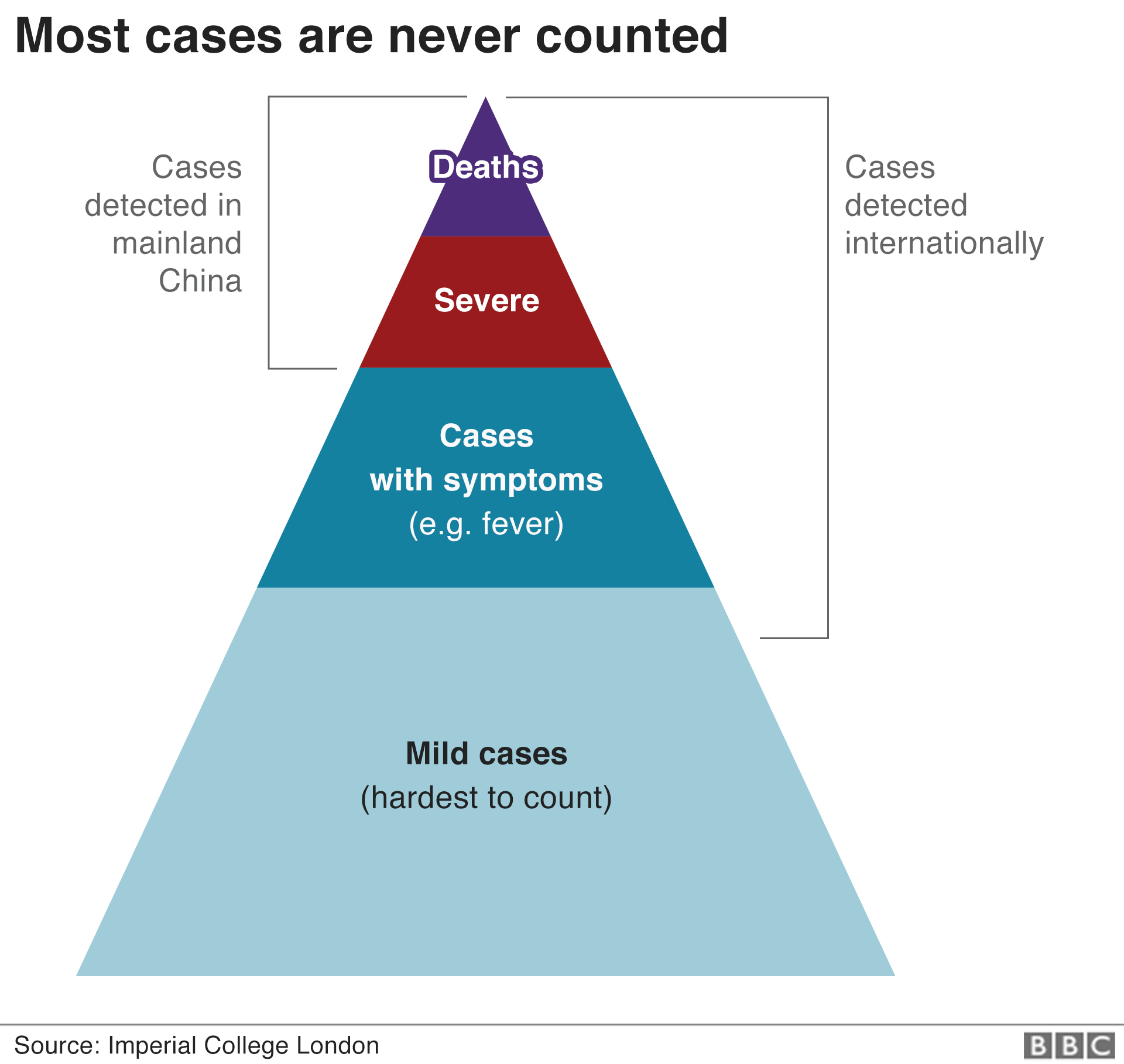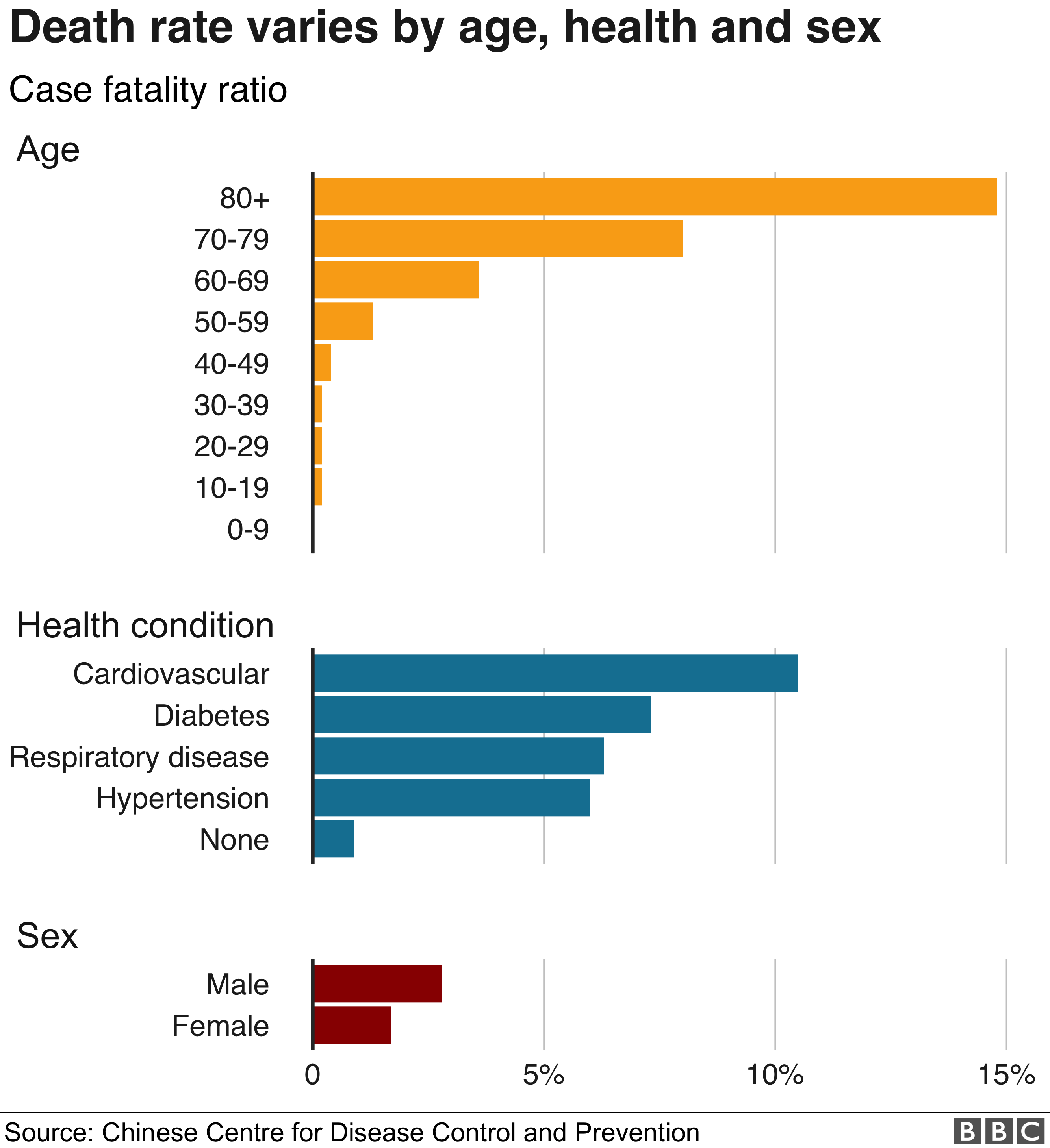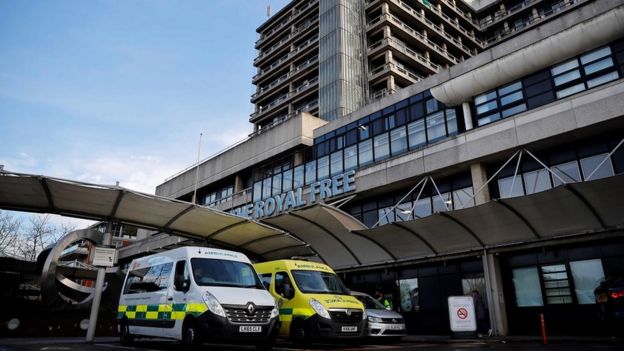Researchers currently think that between five and 40 coronavirus cases in 1,000 will result in death, with a best guess of nine in 1,000 or about 1%.
But it depends on a range of factors: your age, sex and general health and the health system you are in.
 So under-reporting cases makes it easy to overestimate the death rate. But you can also get it wrong in the other direction.
It takes time before an infection results in recovery or death.
If you include all cases that haven't yet had a chance to run their course, you will underestimate the death rate because you are missing the cases that will end in death later.
Scientists combine individual pieces of evidence about each of these questions to build a picture of the death rate.
For example, they estimate the proportion of cases with mild symptoms from small, defined groups of people who are monitored very tightly, like people on repatriated flights.
But slightly different answers from those pieces of evidence will add up to big changes in the overall picture.
If you just use data from Hubei, where the death rate has been much higher than elsewhere in China, then the overall death rate will look much worse.
So scientists give a range as well as a best current estimate.
But even that doesn't tell the full story because there is no single death rate.
What's the risk for people like me?
Some types of people are more likely to die if they contract coronavirus: the elderly, the unwell and, maybe, men.
In the first big analysis of more than 44,000 cases from China, the death rate was ten times higher in the very elderly compared to the middle-aged.
So under-reporting cases makes it easy to overestimate the death rate. But you can also get it wrong in the other direction.
It takes time before an infection results in recovery or death.
If you include all cases that haven't yet had a chance to run their course, you will underestimate the death rate because you are missing the cases that will end in death later.
Scientists combine individual pieces of evidence about each of these questions to build a picture of the death rate.
For example, they estimate the proportion of cases with mild symptoms from small, defined groups of people who are monitored very tightly, like people on repatriated flights.
But slightly different answers from those pieces of evidence will add up to big changes in the overall picture.
If you just use data from Hubei, where the death rate has been much higher than elsewhere in China, then the overall death rate will look much worse.
So scientists give a range as well as a best current estimate.
But even that doesn't tell the full story because there is no single death rate.
What's the risk for people like me?
Some types of people are more likely to die if they contract coronavirus: the elderly, the unwell and, maybe, men.
In the first big analysis of more than 44,000 cases from China, the death rate was ten times higher in the very elderly compared to the middle-aged.

 The death rates were lowest for the under 30s - there were eight deaths in 4,500 cases.
And deaths were at least five times more common among people with diabetes, high blood pressure or heart or breathing problems.
There was even a slightly higher number of deaths among men compared to women.
All of these factors interact with each other and we don't yet have a complete picture of the risk for every type of person in every location.
The death rates were lowest for the under 30s - there were eight deaths in 4,500 cases.
And deaths were at least five times more common among people with diabetes, high blood pressure or heart or breathing problems.
There was even a slightly higher number of deaths among men compared to women.
All of these factors interact with each other and we don't yet have a complete picture of the risk for every type of person in every location.
 Image caption: At least 621 people were infected on the Diamond Princess cruise ship in Japan
Image caption: At least 621 people were infected on the Diamond Princess cruise ship in Japan
 Image caption: Coronavirus patients in England are being treated at a specialist centre at the Royal Free Hospital in London
Image caption: Coronavirus patients in England are being treated at a specialist centre at the Royal Free Hospital in London
How hard is it to work out the death rate?
It is PhD-level hard. Even counting cases is tricky. Most cases of most viruses will go uncounted because people tend not to visit the doctor with mild symptoms. The different death rates we are seeing reported around the world are unlikely to be due to different versions of the virus. According to research by Imperial College, it's because different countries are better or worse at spotting the milder, harder to count cases. So under-reporting cases makes it easy to overestimate the death rate. But you can also get it wrong in the other direction.
It takes time before an infection results in recovery or death.
If you include all cases that haven't yet had a chance to run their course, you will underestimate the death rate because you are missing the cases that will end in death later.
Scientists combine individual pieces of evidence about each of these questions to build a picture of the death rate.
For example, they estimate the proportion of cases with mild symptoms from small, defined groups of people who are monitored very tightly, like people on repatriated flights.
But slightly different answers from those pieces of evidence will add up to big changes in the overall picture.
If you just use data from Hubei, where the death rate has been much higher than elsewhere in China, then the overall death rate will look much worse.
So scientists give a range as well as a best current estimate.
But even that doesn't tell the full story because there is no single death rate.
What's the risk for people like me?
Some types of people are more likely to die if they contract coronavirus: the elderly, the unwell and, maybe, men.
In the first big analysis of more than 44,000 cases from China, the death rate was ten times higher in the very elderly compared to the middle-aged.
So under-reporting cases makes it easy to overestimate the death rate. But you can also get it wrong in the other direction.
It takes time before an infection results in recovery or death.
If you include all cases that haven't yet had a chance to run their course, you will underestimate the death rate because you are missing the cases that will end in death later.
Scientists combine individual pieces of evidence about each of these questions to build a picture of the death rate.
For example, they estimate the proportion of cases with mild symptoms from small, defined groups of people who are monitored very tightly, like people on repatriated flights.
But slightly different answers from those pieces of evidence will add up to big changes in the overall picture.
If you just use data from Hubei, where the death rate has been much higher than elsewhere in China, then the overall death rate will look much worse.
So scientists give a range as well as a best current estimate.
But even that doesn't tell the full story because there is no single death rate.
What's the risk for people like me?
Some types of people are more likely to die if they contract coronavirus: the elderly, the unwell and, maybe, men.
In the first big analysis of more than 44,000 cases from China, the death rate was ten times higher in the very elderly compared to the middle-aged.

 The death rates were lowest for the under 30s - there were eight deaths in 4,500 cases.
And deaths were at least five times more common among people with diabetes, high blood pressure or heart or breathing problems.
There was even a slightly higher number of deaths among men compared to women.
All of these factors interact with each other and we don't yet have a complete picture of the risk for every type of person in every location.
The death rates were lowest for the under 30s - there were eight deaths in 4,500 cases.
And deaths were at least five times more common among people with diabetes, high blood pressure or heart or breathing problems.
There was even a slightly higher number of deaths among men compared to women.
All of these factors interact with each other and we don't yet have a complete picture of the risk for every type of person in every location.
 Image caption: At least 621 people were infected on the Diamond Princess cruise ship in Japan
Image caption: At least 621 people were infected on the Diamond Princess cruise ship in Japan
What's the risk for people where I live?
A group of 80-year-old men in China could have very different risks to men of the same age in Europe or Africa. Your prognosis also depends on the treatment you get. In turn, that depends on what is available and the stage of the epidemic. If the epidemic takes off, then healthcare systems could get swamped with cases - there are only so many intensive care units or ventilators available in any given area. Image caption: Coronavirus patients in England are being treated at a specialist centre at the Royal Free Hospital in London
Image caption: Coronavirus patients in England are being treated at a specialist centre at the Royal Free Hospital in London
Is it more dangerous than flu?
We can't compare mortality rates because many people with mild flu symptoms choose never to visit a doctor. So we don't know how many cases there are of flu, or any new virus every year. But flu continues to kill people in the UK, as it does every winter. As the data evolves, scientists will develop a clearer picture of who would be most at risk should a coronavirus outbreak arrive in the UK. The basic advice from the WHO is that you can protect yourself from all respiratory viruses by washing your hands, avoiding people who are coughing and sneezing and trying not to touch your eyes, nose and mouth.DISCLAIMER: The Views, Comments, Opinions, Contributions and Statements made by Readers and Contributors on this platform do not necessarily represent the views or policy of Multimedia Group Limited.
Tags:
Latest Stories
-
‘Nothing off the table’ in Canada’s response to US tariff threat
1 hour -
New suspected Marburg outbreak in Tanzania kills eight – WHO
2 hours -
Kenyan minister alleges intelligence agency behind his son’s abduction
2 hours -
No more miners trapped underground in South Africa, volunteers say
2 hours -
US issues fresh round of sanctions against Russia ahead of Trump return to White House
2 hours -
Death toll from South African mine siege rises to 78, rescued now at 166
3 hours -
Biden takes aim at ‘tech industrial complex’ in farewell speech
3 hours -
Biden says Gaza deal based on his framework while Trump claims credit
3 hours -
Ex-convict, 22, jailed in Tarkwa for threatening to stab student
5 hours -
The would-be African nation in love with Donald Trump
5 hours -
‘We’re not investigating, we’re validating’ – Domelevo clarifies ORAL Committee’s role
5 hours -
JoyNews poll: Akufo-Addo, his government’s ‘killer’ taxes and nepotism blamed for NPP’s 2024 defeat
5 hours -
Malian PM arrives in Accra with special message for Mahama
6 hours -
What happens if TikTok is banned in US?
6 hours -
US bans red dye 3 from some frosting, candy and medicine
6 hours

